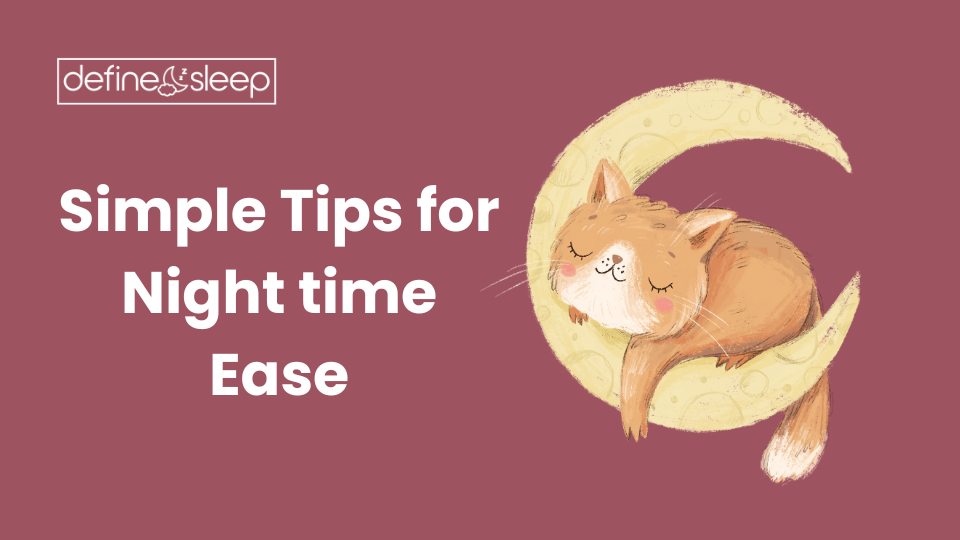Introduction
In the fast-paced rhythm of our daily lives, the quest for a restful night’s sleep often feels like an elusive challenge. At the core of this pursuit lies a crucial yet often overlooked factor: emotional control. This discussion aims to unravel the intricate relationship between emotional regulation and sleep quality.
Before unveiling practical tips for nighttime ease, it is essential to grasp the psychological dimensions of sleep, where the mind and body are interconnected in shaping our nightly rest. From the profound impact of emotions on sleep disruptions to actionable tips for emotional well-being, this exploration navigates the complex terrain of achieving a peaceful night. As we delve into the psychological aspects, we seamlessly transition to the biological factors influencing our sleep, offering a comprehensive guide to embracing a holistic approach to rejuvenating a night’s sleep.

1.1: The Impact of Lack of Emotional Control on Sleep
In the hustle and bustle of our daily lives, achieving a restful night’s sleep can often seem elusive. One of the key factors influencing our sleep quality is emotional control. Let’s delve into how emotional regulation, or the lack thereof, can impact our nightly rest and explore simple tips to ease your nights.
1.2: Understanding the Psychology Behind Sleep
Before we jump into the tips, it’s essential to comprehend the psychological aspects of sleep. The mind and body are intricately connected, and various psychological factors can either promote or hinder a good night’s sleep. Lack of emotional control is one such factor, and its repercussions on rest are profound.
1.3: Lack of Emotional Control and Sleep Disruptions
When emotions run high, the body often struggles to find the tranquility necessary for restful sleep. Anxiety, stress, and even excitement can trigger physiological responses that make it challenging to unwind. Understanding this connection is the first step towards addressing the issue and improving your sleep hygiene.

1.4: Simple Tips for Emotional Well-being at Night
Now, let’s explore practical tips to enhance emotional control at night and pave the way for a more peaceful sleep routine.
Tip 1: Establish a Relaxing Pre-Sleep Ritual
Create a calming pre-sleep routine to signal to your body that it’s time to wind down. This could include reading a book, practicing mindfulness, or enjoying a warm bath. Consistency is crucial in making this ritual effective.
Tip 2: Practice Mindfulness Meditation
Mindfulness meditation is a powerful tool for managing emotions. Spending a few minutes in mindfulness before bedtime can help calm a racing mind, reducing stress and anxiety. Various apps and guided sessions are available to assist you in incorporating mindfulness into your nightly routine.
Tip 3: Journaling for Emotional Release
Consider keeping a journal to express and release your emotions before bedtime. Writing down your thoughts and feelings can be therapeutic, helping you process emotions and preventing them from carrying over into the night.
Tip 4: Limit Screen Time Before Bed
The blue light emitted by screens can interfere with the production of melatonin, a hormone crucial for regulating sleep. Aim to limit screen time at least an hour before bedtime to promote a more natural transition into sleep.
Tip 5: Create a Comfortable Sleep Environment
Ensure your bedroom is conducive to relaxation. Invest in a comfortable mattress and pillows, control the room’s temperature, and minimize noise and light disruptions. A peaceful environment can significantly contribute to emotional well-being at night.
1.5: The Biological Connection to Nighttime Ease

Beyond psychology, our biological makeup plays a crucial role in our ability to achieve nighttime ease. Let’s explore how understanding our body’s natural rhythms can enhance the quality of our sleep.
1.6: Circadian Rhythms and Sleep
Our bodies operate on a circadian rhythm, a natural, internal process that regulates the sleep-wake cycle. Disruptions to this rhythm, such as irregular sleep patterns or exposure to artificial light at odd hours, can hinder our ability to achieve restorative sleep.
1.7: Tips for Aligning with Your Body’s Biological Clock

Tip 6: Establish a Consistent Sleep Schedule
Go to bed and wake up at the same time every day, even on weekends. This helps regulate your body’s internal clock, making it easier to fall asleep and wake up naturally.
Tip 7: Prioritize Natural Light Exposure
Expose yourself to natural light during the day, especially in the morning. Natural light helps regulate your circadian rhythm, promoting alertness during the day and better sleep at night.
Tip 8: Be Mindful of What You Eat and Drink
Avoid heavy meals, caffeine, and nicotine close to bedtime. These substances can disrupt your sleep, making it harder to achieve nighttime ease.
1.8: Bringing it All Together

Achieving nighttime ease is a holistic endeavor that involves understanding and addressing both psychological and biological factors. By incorporating these simple tips into your routine, you can pave the way for restful nights and wake up refreshed, ready to tackle the day ahead.
In conclusion, the journey to nighttime ease begins with self-awareness and small, consistent changes to your habits. Embrace the interconnected nature of your mind and body, and you’ll find yourself drifting into peaceful slumber more effortlessly. Sweet dreams await when you prioritize your emotional and biological well-being at night.
FAQ

Q1: How does lack of emotional control affect sleep, and why is it important to address it?
Lack of emotional control can lead to heightened stress and anxiety, making it difficult to unwind before bedtime. Addressing emotional well-being is crucial for creating a conducive environment for restful sleep.
Q2: How do circadian rhythms impact our sleep, and why is a consistent sleep schedule essential?
Circadian rhythms regulate our sleep-wake cycle, influencing our alertness and sleep quality. Maintaining a consistent sleep schedule helps synchronize these rhythms, promoting better sleep quality.
Q3: Can practicing mindfulness meditation improve sleep, and how can one incorporate it into their nightly routine?
Mindfulness meditation has been shown to reduce stress and calm the mind, improving sleep. Incorporating mindfulness can be done through guided sessions or apps, providing practical techniques for relaxation.
Q4: What role does screen time play in sleep disruptions, and how can it be minimized before bedtime?
Screens emit blue light, which can interfere with melatonin production, a hormone crucial for sleep. Minimizing screen time an hour before bedtime and adopting relaxing activities can aid in the transition to sleep.
Q5: How does the sleep environment contribute to nighttime ease, and what changes can be made for a more conducive setting?
Creating a comfortable sleep environment involves factors like mattress quality, room temperature, and minimizing noise and light disruptions. A peaceful environment contributes significantly to emotional well-being at night, promoting better sleep.
Help From Chatgpt 4




